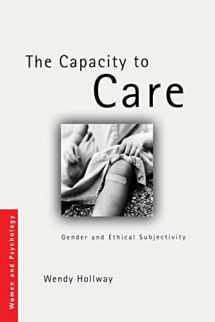
The Capacity to Care: Gender and Ethical Subjectivity (Women and Psychology)
ISBN-13:
9780415399685
ISBN-10:
0415399688
Edition:
1
Author:
Wendy Hollway
Publication date:
2006
Publisher:
Routledge
Format:
Paperback
162 pages
FREE US shipping
Book details
ISBN-13:
9780415399685
ISBN-10:
0415399688
Edition:
1
Author:
Wendy Hollway
Publication date:
2006
Publisher:
Routledge
Format:
Paperback
162 pages
Summary
The Capacity to Care: Gender and Ethical Subjectivity (Women and Psychology) (ISBN-13: 9780415399685 and ISBN-10: 0415399688), written by authors
Wendy Hollway, was published by Routledge in 2006.
With an overall rating of 4.4 stars, it's a notable title among other
Personality
(Psychology & Counseling, Social Psychology & Interactions, Psychiatry, Psychology, General, Social Psychology & Interactions, Women's Studies) books. You can easily purchase or rent The Capacity to Care: Gender and Ethical Subjectivity (Women and Psychology) (Paperback) from BooksRun,
along with many other new and used
Personality
books
and textbooks.
And, if you're looking to sell your copy, our current buyback offer is $0.3.
Description
Wendy Hollway explores a subject that is largely absent from the topical literature on care. Humans are not born with a capacity to care, and this volume explores how this capacity is achieved through the experiences of primary care, gender development and later, parenting. In this book, the author addresses the assumption that the capacity to care is innate. She argues that key processes in the early development of babies and young children create the capability for individuals to care, with a focus on the role of intersubjective experience and parent-child relations. The Capacity to Care also explores the controversial belief that women are better at caring than men and questions whether this is likely to change with contemporary shifts in parenting and gender relations. Similarly, the sensitive domain of the quality of care and how to consider whether care has broken down are also debated, alongside a consideration of what constitutes a ‘good enough’ family. The Capacity to Care provides a unique theorization of the nature of selfhood, drawing on developmental and object relations psychoanalysis, as well as philosophical and feminist literatures. It will be of relevance to social scientists studying gender development, gender relations and the family as well as those interested in the ethics of care debate.


We would LOVE it if you could help us and other readers by reviewing the book
Book review

Congratulations! We have received your book review.
{user}
{createdAt}
by {truncated_author}


